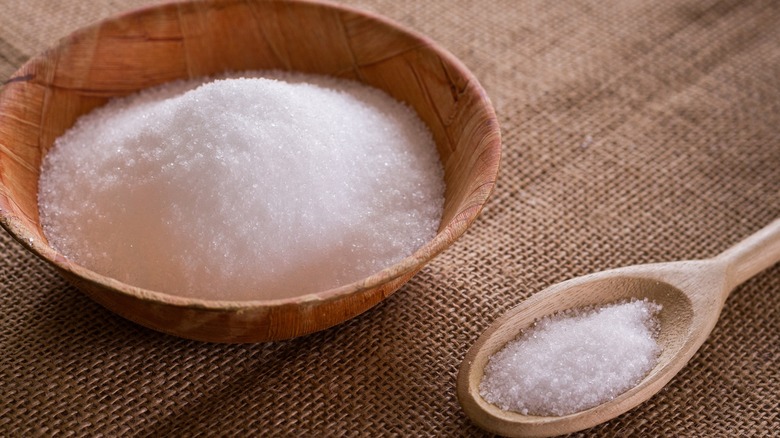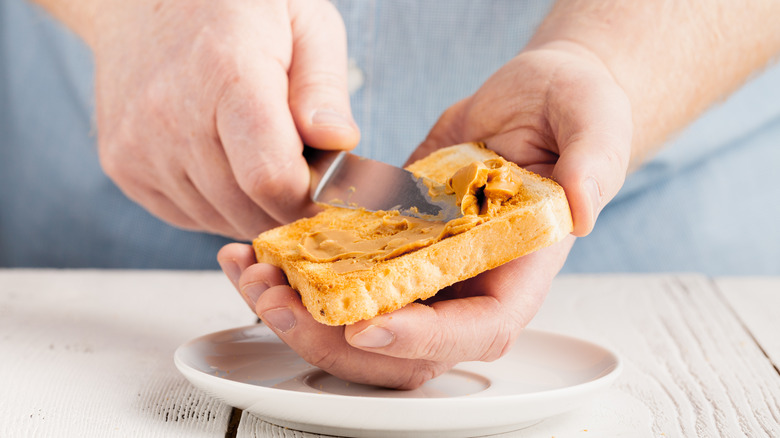The Peanut Butter Ingredient You Should Avoid Eating If You Have Tummy Troubles
An upset stomach can be a challenging thing to deal with. Whether you're experiencing gas, bloating, diarrhea, or cramping, the only relief often comes from being positioned somewhere close to a bathroom. While all of us experience the occasional bout of diarrhea, for some of us, our tummy troubles are of a more serious and regular nature. Take someone with irritable bowel syndrome (IBS), for example, or a person dealing with Crohn's disease or ulcerative colitis — two conditions that come under what is broadly referred to as inflammatory bowel disease (IBD). There's also small intestinal bacterial overgrowth, more commonly known as SIBO. Watching what you eat is part and parcel of managing these health conditions.
Peanut butter has remained on the list of foods many people with tummy troubles can safely consume. It's a great source of protein, healthy fats, and fiber. In fact, peanut butter is even comparable to beef protein when it comes to nutrition. But there's a catch for those with digestive issues — the ingredient list of this popular nut butter. Sugar alcohols, or more specifically, ingredients like sorbitol, xylitol, and mannitol, can cause digestive distress in some people. When it comes to peanut butter, sugar alcohols (also called polyols) commonly appear as xylitol. Let's take a look at why xylitol is problematic for some.
Why is xylitol concerning for some people?
If you were to Google xylitol, you'd likely come up with a few different sites listing its benefits. Xylitol, a natural sugar alcohol, is found in trace amounts in certain fruits and vegetables. You'd probably see it listed as an ingredient on the labels of diabetes-friendly products, chewing gums, and even toothpaste. It's considered a low-glycemic food, unlike high-fructose corn syrup or regular sugar (which means there's minimal risk of blood sugar spikes). It's even been studied in the context of improving your gut health, by promoting the prevalence of "good" gut bacteria. This particular benefit has been linked to its less-digestible and fermentable properties.
But for people with digestive issues, these same properties can become a concern. Xylitol is a high-FODMAP sugar alcohol. FODMAP, or fermentable oligosaccharides, disaccharides, monosaccharides, and polyols, refers to carbohydrates that aren't easily digested in your gut. Poor absorption means your gut bacteria start to ferment the ingredient. For people with IBS and other gut issues, this can result in bloating and gas. Furthermore, xylitol can have a laxative effect on some people by pulling water to your stools (hence the diarrhea). This doesn't mean you have to avoid eating peanut butter altogether, though. It just means you have to be mindful of the ingredient list.
Consuming peanut butter when you have tummy troubles
Those with sensitive tummies should opt for brands of peanut butter that don't contain this sugar alcohol or any other polyols. It's also worth noting that xylitol can be potentially toxic to cats and dogs, being linked to insulin overproduction, hypoglycemia, liver failure, and even death. Going for a xylitol-free version is a good idea if you're in the habit of treating your furry friend to some peanut butter every now and then.
For those with irritable guts, another ingredient to watch out for is high-fructose corn syrup, which can also make symptoms of IBS worse. Plus, even though the breakfast spread is filled with healthy fats, it is still considered a high-fat food. If your digestive concerns include fat intolerance, this is something you might want to be mindful of — and in the interest of limiting trans fats, it can help to avoid peanut butters with high amounts of hydrogenated oils. Keeping a limit on portion size (two tablespoons a day) can also help if you have digestive issues. Whether you tolerate the crunchy or smooth kind better (which comes down to your digestive situation), overconsumption of peanut butter is a problem for anyone.
What you pair peanut butter with matters, too. Avoid eating it with high-FODMAP foods like regular wheat-bread, apples, or yogurt. Opt for lower-FODMAP pairings instead, like sourdough bread, buckwheat bread, unripe bananas, and carrots.



